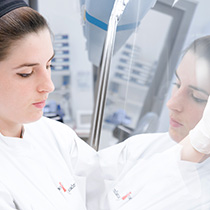Cell Culture Comprehensive Course - Practical Training
Content & Learning ObjectiveThis course provides comprehensive knowledge and builds upon your existing expertise at the same time. The aim is to make your daily cell culture work safer and more efficient. Beginners as well as long-term users of cell culture often work with only limited knowledge about the "why" behind techniques as protocols are derived from being trained quickly by a colleague or via "learning-by-doing". However, cell culture has changed over the last years and many new options and tools are available. Standards such as GCCP (good cell culture practice) have been implemented and are continuously changed to meet the requirements of state-of-the-art demands. Furthermore, introducing standards will help you to increase reproducibility and accuracy. Understanding the "why" will help you trouble shoot your experiments. During this course, you will have sufficient time to acquire or troubleshoot practical experience and in addition, we will introduce you to smart ideas, standards, documentation and cell banking. |
 |
The theoretical seminars include:
- Aseptic techniques
- Contamination (including mycoplasma)
- Routine methods in cell culture (passaging, thawing, freezing)
- Ingredients of culture media
- FCS and reproducibility
- Cell culture plastic ware
- Differences between cell lines and primary cells
- Cell counting and viability testing
- Growth curves
- Cell banking
The practical parts include:
- Aseptic working technique: workshop
- Trypsinization, freezing, and thawing of cells
- Cell counting and vitality stain
- Medium exchange for adherent and suspension cells
- Microscopy and tips for analysis
- Recognition of contamination
Frequently combined further topics for in-house courses
This content is adapted, supplemented and shortened for in-house courses according to requirements and customer wishes. Depending on the content, group sizes and available sterile workbenches, the course can be designed between 1 and 4 days long. All content is customized. Additional topics could include:
- Mycoplasma and mycoplasma test kits
- Hygiene relevant equipment (e.g. sterile bench, incubator) and their selection, cleaning and testing
- SOP workshop: sterile work technique
- Standardization
- Bioassays
Target Group
Technical and scientific staff members with no previous cell culture experience or little cell culture experience are the primary target. However, this course is also recommended for long-term cell culture users, as it helps to troubleshoot aseptic technique, gives an overview over new developments and offers many tricks and tips.
Duration
3-4 days.
Dates and pricing
Please contact us for an offer tailored to your needs. All dates are set to suit your schedule. Usually a course can be performed as fast as 4-8 weeks after the initial contact. Depending on the level of your group, topics can also be added or removed to better fit the training necessities. Our contact details are found here.
Trainer
| Dr. Nicole Kühl studied Biology at the Technical University of Karlsruhe and the University of Bremen. 1999 she completed her Ph.D. in cell and molecular biology studying the cell cycle and heat shock proteins. Dr. Kühl then began her post-doctorate work at the Academic Hospital Groningen in the Netherlands, where she specialized in research related to multiple sclerosis and worked with primary glial cells. In 2005, she continued her work at the Jacobs University Bremen, where she led a research group and lectured in biochemistry and cell biology. From 2008 to 2011, Dr. Kühl was the head of the PromoCell Academy and taught cell culture courses. Since 2012, she is a freelance trainer and consultant in the area of cell culture quality control as well as GMP/ATMPs and runs the cell culture web site InCelligence.de. Watch Dr. Kühl in a video from our MOOC. |  |


